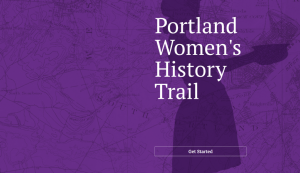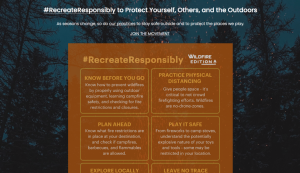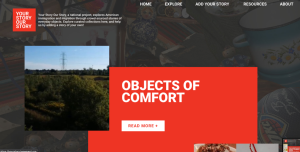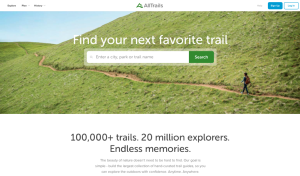Theme: National Trails Day
Back to Top
|
 |
|
Hiking 101
|
Social studies |
|
Tomorrow, June 5, hikers will celebrate National Trails Day, an annual recognition of the recreation opportunities and preservation needs within green spaces. For those new to hiking, perhaps the celebration will spark a new interest; the American Hiking Society's (AHS) Hiking 101 portal is a great resource for those looking to get started. Home to information on everything from hiking etiquette to outdoor gear, the site has answers to many common questions. Resources are organized into five sections: Before You Go, Outdoor Skills, Gear, Safety & First Aid, and All About Trails. An especially important section of the site, found within the All About Trails category, discusses racism in outdoor spaces and provides antiracism resources, as well as a list of individuals and organizations to support. These materials, and all of the offerings on the Hiking 101 page, contribute to AHS's mission of "empowering all to enjoy, share, and preserve the hiking experience." [EMB] |
|





|
|
 |
|
Reclaiming History As an Indigenous Hiker
|
Social studies |
|
"What does it look like to be a respectful and responsible traveler when we're traveling to these other spaces?" It is a question everyone should wrestle with, whether out on a hiking or camping adventure or traveling for other professional or personal reasons. The question is further explored on this episode of the travel podcast Let's Go Together. Listeners will enjoy a 40-minute conversation between host Kellee Edwards, a pilot and travel media expert, and Jolie Varela, a citizen of the Tule River Yokut and Paiute Nations and the founder of Indigenous Women Hike. Varela discusses the history of public land, including the forced removal of and violence against Indigenous people, and how this power dynamic is too often erased from our historical understanding of outdoor spaces. Other central themes within the episode include relearning the ancestral landscape, using respectful language to acknowledge the Indigenous land someone is on, and re-defining "outdoorsy" and outdoors heroes. The episode, and the podcast in its entirety, can also be found on Apple Podcasts, Spotify, and Stitcher. [EMB] |
|





|
|
 |
|
 |
|
Portland Women's History Trail
|
Social studies |
|
Though the first image sparked by the word "trail" may be a secluded natural area, other types of trails also exist. For example, the Portland Women's History Trail, which is divided into seven sections and highlighting two centuries of groundbreaking women, encapsulates history in the places it was shaped. Weaving through downtown Portland, ME and several neighborhoods, visitors can walk along several miles of historical landmarks. Thanks to this digital exhibition, people can also expand their historical knowledge sans any exercise. Readers may want to begin with the About the Trails section, which provides a brief background. Then, click through the seven sections to digitally meander historical landmarks, people, and events. The embedded text and images make for an authentic and educational adventure. Viewers can also explore directly on the Map or by clicking through an alphabetized list of Sites. The project is a collaboration between the University of Southern Maine, Maine College of Art (MECA), Maine Humanities Council, and Maine Historical Society. Funding was provided by the Maine Economic Improvement Fund (MEIF) for Digital Maine. [EMB] |
|





|
|
 |
|
Recreate Responsibly
|
Social studies |
|
Whether a new or experienced trail enthusiast, everyone should always be conscious of responsible recreation. In fact, this theme has been widely shared using the hashtag, #RecreateResponsibly. At the link above, readers can access a toolkit by the same name, created by the Recreate Responsibly Coalition. After entering the site (by clicking any of the landing page links) select the "Get the Toolkit" button in the top right corner to access the guide in one of several languages, including English, Spanish, Chinese, Arabic, and American Sign Language. The toolkit contains sample social media messages to share responsible recreation guidelines and links to other resources, such as the Native Land map (a tool to search and acknowledge the Indigenous land users are on). The site also features a blog and a Resource Hub with a bevy of information, from inclusivity resources to materials curated by outdoor activity (e.g., cycling or skiing). Readers can also check out the coalition on social media: Instagram (@recreate.responsibly), Twitter (@RecreateInfo), and YouTube (Recreate Responsibly). [EMB] |
|





|
|



















